Mau Mau movement. "Kenyan safari" British colonialists
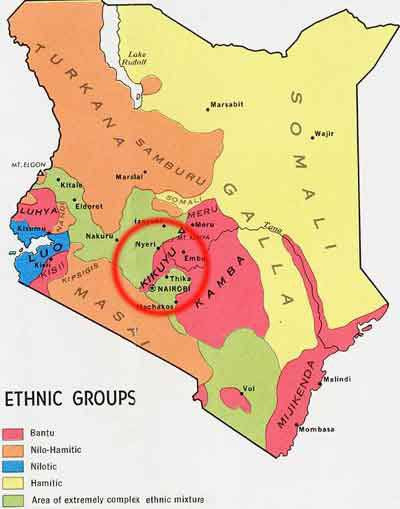
The emergence of "Mau Mau"
The backbone of the Mau Mau were representatives of the Kikuyu people. It is the largest nation of Kenya. Currently, its number reaches 6 million. These are mainly farmers and herders speaking the Kikuyu language of the Bantu group of the Benue-Congolese language family. Kikuyu professed and continue to profess their traditional beliefs, while undergoing significant Christianization in the colonial period.
As the largest people of Kenya, it was Kikuyu who stood at the origins of the country's national liberation movement in the mid-twentieth century. This was explained by the fact that in colonial Kenya Kikuyu were in a very unfavorable economic situation. European farmers, with the permission and with the direct support of the colonial authorities, seized the best agricultural land for themselves. Kikuyu lost their economic base and were forced to enter as laborers on European farms and plantations, or to go to hired laborers. Moreover, a significant part of Kikuyu was marginalized and replenished the ranks of urban paupers, settling on the outskirts of Nairobi and forming slum settlements with a large population, interrupted by casual earnings, and even outright poverty and crime. The British authorities practically forcibly used many Kikuyis for various jobs, both in agriculture and industry, effectively turning them into slaves.
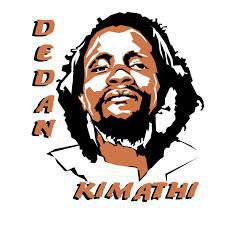 Kikuyu by nationality and a veteran of the Second World War was the founder of the movement "Mau Mau" Dedan Vachiuri Kimati (1920-1957). He was born in Nyeri, managed to finish missionary school and get a teacher’s job in elementary school. Then he went to serve in the colonial administration - that is, he began the path of a typical representative of the local educated stratum of the population. Like many Kenyans, Kimati was mobilized during World War II and served in the British colonial forces. He became a member of the rebel movement at the end of 1940 and quickly moved to leadership positions as an educated person, especially with military service experience. In October 1952, it was Kimati who led the largest Mau Mau faction in the Aberdare wooded mountains.
Kikuyu by nationality and a veteran of the Second World War was the founder of the movement "Mau Mau" Dedan Vachiuri Kimati (1920-1957). He was born in Nyeri, managed to finish missionary school and get a teacher’s job in elementary school. Then he went to serve in the colonial administration - that is, he began the path of a typical representative of the local educated stratum of the population. Like many Kenyans, Kimati was mobilized during World War II and served in the British colonial forces. He became a member of the rebel movement at the end of 1940 and quickly moved to leadership positions as an educated person, especially with military service experience. In October 1952, it was Kimati who led the largest Mau Mau faction in the Aberdare wooded mountains. The anti-British Kikuyu movement emerged in 1920 year - it was the Young Kikuyu Association, established in Nairobi by the locals. In 1922, her demonstration was shot by British police, and 25 people were the victims of the crackdown. The political regime in the colony was tightened, but it rather played against the British. Instead of legalizing the opposition and having control over its sentiments, leaders and activities, the British authorities themselves contributed to the departure of anti-colonial activists in the underground.
The origin of the name "Mau Mau" is not precisely known. There are several versions. The first is that it is the common name of the Kikuyu people by the British colonialists. The second is that this abbreviation is a Swahili word “Mzungu Aende Ulaya, Mwafrika Apate Uhuru” - “Let the Europeans return to Europe, Let the Africans regain independence”. Most likely, the British used the word "Mau-Mau" to designate an uprising purposefully - to create in the eyes of the world community insurgents images of savages, the suppression of which is not something shameful and inhumane. After all, in fact, the rebel organization was called quite modern and “civilized” - the Kenyan Army of Land and Freedom (KLFA), practically - “Land and Freedom”. A certain role in its creation was played by the cults of the “dini”, the followers of which were an increasing number of Kenyans. These cults were distinctly anti-British in nature, at the same time attracting the local population with all sorts of benefits - healing the disease, increasing reproductive abilities, preventing the death of livestock, and so on. However, the leaders of the cults demanded from their adepts not to perform Christian rites, not to wear European clothes, not to shave, not to speak in English, and so on. That is, whenever possible as much as possible to deny the orders and culture imposed by the colonizers.
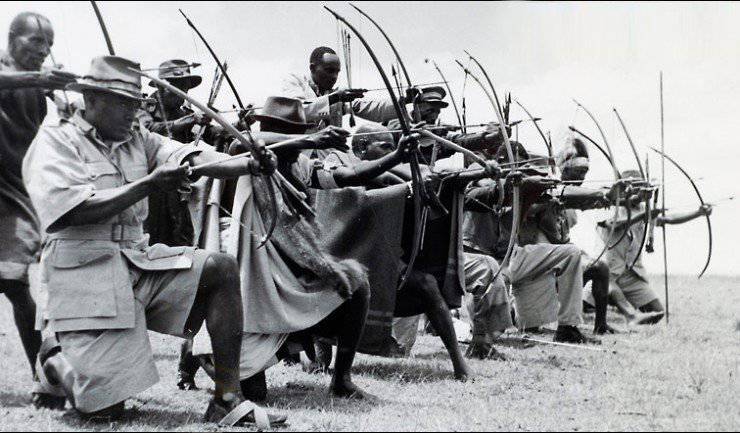
The first news of the rebel movement in Kenya dates back to the 1948 year, and to the 1950 year it became very active. The burning of farms and households of Europeans began. In 1952, the colony governor Evelyn Baring declared a state of emergency in Kenya. This was due to the increased activity of anti-colonial forces. The governor requested additional military contingents that were deployed to Kenya from other African colonies of Great Britain and from the Suez Canal region. Among the troops being deployed were both British and African units. The colonial authorities issued 183 arrest warrants to Kenyan oppositionists and by the morning of October 21 about a hundred activists had been detained. However, the British authorities did not succeed in suppressing the movement by these repressive measures, since the Mau Mau enjoyed widespread support among the population. Mass arrests and searches took place in the capital of the colony of Nairobi, especially in the suburbs of the city, where immigrants from the villages lived, traditionally more prone to anti-colonial attitudes.
Peperhod to the guerrilla war
One of the main forms of Mau Mau activity was attacks on farms of European landowners. The colony was inhabited by a large number of farmers - the British and representatives of other European nations, who had impressive land tenure and used the labor of local laborers and servants. The last factor set them up - the African servants sympathized with their fellow tribesmen - the rebels, and not with the European masters, and when possible, acted as gunners. However, we must pay tribute, not in all cases, African servants were on the side of the rebels. So, when October 29 of 1952 of the year, the first white farmer Eric Boyer was killed in retaliation for the beginning of mass repressions against the Mau Mau movement, two of his servants, the rebels, were also killed by Africans.
Attacks on European farms were carried out by mobile groups of about ten people. However, there were also much more massive Mau Mau attacks, in which hundreds of insurgents took part. In this case, the colonial authorities could not protect the white population of Kenya. In response to the attacks, the British authorities carried out raids on territories where Mau Mau could be based. First of all, these were forest tracts, especially in the area of modern national parks Eburru and Aberder.
June 1953 was marked by the appointment of General George Erskine (1899-1965) as commander of troops in the region.
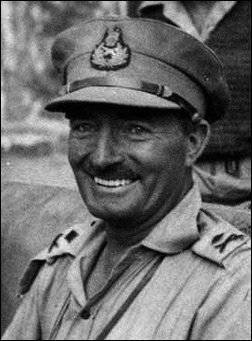 He was an experienced soldier in the British Army who commanded during World War II. tank a division that fought in North Africa, Italy and Normandy, then served as commander in chief of troops in Hong Kong, commander of the Eastern Command of the British forces. He was known not only for his military experience, but also for his great connections at the British top, which allowed him to act in accordance with his own point of view, without listening to the opinions of the public and parliamentarians.
He was an experienced soldier in the British Army who commanded during World War II. tank a division that fought in North Africa, Italy and Normandy, then served as commander in chief of troops in Hong Kong, commander of the Eastern Command of the British forces. He was known not only for his military experience, but also for his great connections at the British top, which allowed him to act in accordance with his own point of view, without listening to the opinions of the public and parliamentarians.At the same time, the Kenyan command was reassigned directly to London, whereas earlier it was subordinate to the headquarters in Cairo. After that, police operations were significantly tightened. The filtration camps contained about 12 thousands of Kenyans arrested on charges of collaborating with insurgents. 15 January 1954 was placed in the hands of the police by Baruchu Itote himself - one of the key leaders of the movement, whose interrogation helped the colonial authorities to answer many questions regarding the internal organization of the insurgency, its provision of ammunition and food, bases and so on.
To achieve at least some results in the fight against the rebels, the British authorities extremely tightened the rules in the colony, trying to intimidate the local population. A decision was made to execute on the spot any African who appears in areas of the alleged Mau Mau base. However, since a significant part of the rebels was also based in the suburbs of Nairobi, gradually curfew and police sweeps became integral companions of the African population in the capital. On April 24, 1954, a state of siege was introduced in the capital, after which total checks of the African population began. All suspicious Africans went to the filtration camp. At the same time, the construction of roads in the forests began, the air was lifted aviation.
Counter-partisan measures are becoming more effective
Realizing that only the army units and the police could not solve the problem of "Mau Mau", the British authorities began to implement the old idea of creating counter-guerrilla groups. They hired local criminals and amnestied rebels, who, being Africans, knew the local trails much better and captured their fellow tribesmen. In 1953, this unit was declared an integral part of the African colonial forces. Thus, Kenyan society is divided. One part supported the rebels and supplied them with food and human resources, the other supported the colonial authorities. Naturally, the armed confrontation between the two groups of people soon began. The counter-partisan detachments hunted against the rebels and the peasants sympathizing with them, simultaneously engaging in looting and violence against the peaceful population. In turn, the rebels punished death for cooperation with the authorities, including did not disdain the burning of villages inhabited by "collaborators" and the destruction of peasants who refused to oppose the British colonialists.
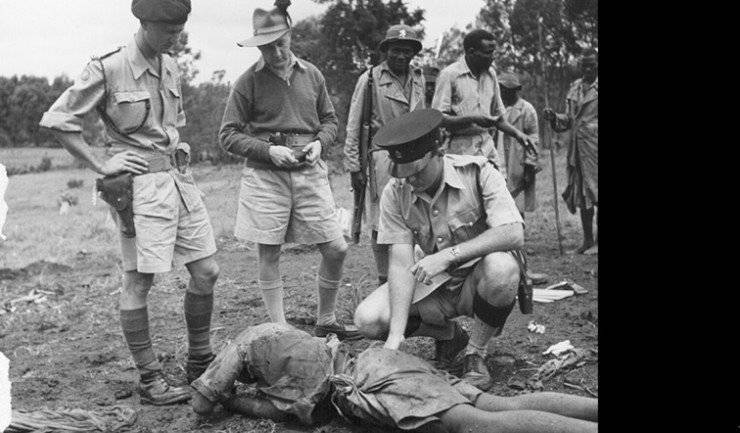
Gradually, the British command showed more and more ingenuity in the search for effective methods of counter-guerrilla warfare, including, among other things, the experience of the struggle against the communist partisans in British Malaya. For reconnaissance operations against the insurgency, special groups were established by the colonial authorities, acting under the guise of "Mau Mau". These groups included 8-10 people. As a rule, their backbone was made by the Kikuyu authorities. In each group was white - the head. He put on his face as a Negro, dressed a wig out of a dead rebel's hair or a hat. In this case, the white commander was assigned a fighter - a bodyguard, whose task was to divert attention from the commander and his cover in case of danger. Scouts dressed in clothes removed from the killed "Mau Mau", which was not specifically erased, so as not to give out the clean smell of people masquerading as partisans living in the forest. Entering the village of Kikuyu, which was sympathetic to the rebels, the scouts asked to spend the night under the guise of "Mau Mau" and inquired about the information. After that, the information was communicated to the counterpartisan teams. These teams typically included British police officers 3, African police officers 15, and a guide. In addition to these units, self-defense detachments were created by white farmers, who conducted independent raids on villages supporting the partisans, acting primarily to intimidate the local population.
British propaganda, in order to blacken the "Mau Mau" in the eyes of the world community and reduce their support for the Kenyan population, constantly disseminated negative information about their activities, including accusing them of excessive cruelty, reprisals against the civilian population and even the use of witchcraft and black of magic. For Africans, the latest accusations were especially significant - many dark peasants no longer sympathize with the rebels because of fear of associating with sorcerers. “Mau-Mau” managed to accuse even of bestiality, and with ritual purposes - obviously, in order to present the maximum savages, unworthy of pity from a civilized society.
However, the Mau Mau cruelty was exaggerated - for all the years of their existence, they killed only 32 European farmers and 49 Indians (in East Africa, people from India were always the privileged class, second only to Europeans, and were engaged in business or in the colonial administration ). As for the civilian population, here the “Mau Mau” was more cruel - they killed 1800 representatives of the Kenyan peoples who collaborated with the colonial authorities. The 200 of British soldiers, police officers, about the Royal African Riflemen 500 of the local corps of colonial troops died in the fighting with the "Mau Mau". It is not known that the "Mau Mau" made attacks on infrastructure facilities, engaged in economic sabotage.
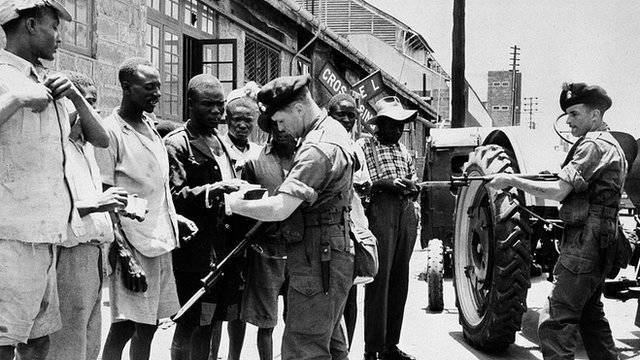
The British military and police acted no less, and even more brutally, than the rebels suppressed by them. So, one of the white farmers described his participation in the bullying of a captive rebel like this: “By that time, I cut off his eggs and ears and put out his eyes. It’s a pity he died before we got a lot of information from him ”(Elkins Caroline Britain’s Gulag: The Brutal End of Empire in Kenya. - London: Pimlico, 2005.). There have been cases of brutal group rape of local women, harassment of them by shoving bottles and other objects in the genitals, cutting off the genitals to men. The castration of the captured rebels, as well as civilians, who were only suspected of sympathizing with the Mau Mau, took on a massive scale in Kenya. This has been the case with so many men who are suspected of sympathizing with the rebels in the filtration camp. In general, the British colonialists no less than the "uncivilized" Kenyan peasants - the rebels, showed sophisticated sadistic inclinations. According to the official data of the British authorities during the uprising, 11 500 rebels were killed by Mau Mau rebels, while civilian casualties were denied for a long time. According to independent researchers, including British researchers, the number of civilian casualties is tens of thousands and is about 50-70 thousand people.
Also, the colonial authorities are concerned about depriving the rebels of access to food resources. First of all, a defensive ditch with barbed wire was dug along the forest in Aberdare, at certain sections of which police posts were located. Local farmers were forbidden to cultivate the land near the forest and graze cattle there. They also decided to relocate the peasants from remote villages, which were viewed as potential rebel bases.
Suppression of the uprising
It should be noted that the harsh policy of the colonial authorities gave certain results. The number of rebels significantly reduced. In October 1956, the leader of the Mau Mau Kimati was captured. October 17 he was injured, but managed to escape into the woods. However, 28 watches in the continuous path through the forest did their job - it was greatly weakened, although it was able to hold out in the 4 forest of the day until October 21 was discovered by the police. In February 1957, Kimati was executed. It is believed that the Mau Mau movement actually ceased to exist in 1956, and in 1960, the state of emergency in the colony was lifted. December 1963 was marked for Kenya by the official proclamation of state independence.
In independent Kenya, the participants in the Mau Mau rebellion did not immediately turn into national heroes. The first president of Kenya, Jomo Kenyatt, did not sympathize with the methods of wrestling "Mau Mau" and forbade their activities and references to them. Moreover, Kenyatta did not want to quarrel with the UK - Kenya remained one of the "exemplary" African countries. It is noteworthy that Jomo Kenyat himself spent seven years in exile, before being proclaimed independence of Kenya, for belonging to the Mau Mau movement. Although, most likely, he was closed because he led the party "Union of Africans of Kenya" - the main opposition organization in the country, which was almost more dangerous for the British than the activities of the insurgency. In any case, it was Kenyatta who proclaimed 12 on December 1963 of Kenya’s independence.
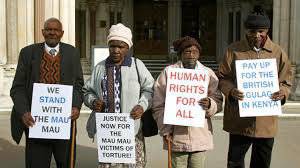 Only after Kenyat died, and then the political regime laid down by him, did the Kenyan authorities ’attitude to this page in stories State has changed dramatically. In modern Kenya, Mau Mau began to be heroic. A special holiday, the Day of Heroes, 20 of October, dedicated to the memory of Mau Mau was introduced. In 2003, the Association of Mau Mau War Veterans was registered, one of the key tasks of which was to demand from the British authorities an official apology for their actions and payment of monetary compensation to the insurgents and their relatives who had suffered from torture.
Only after Kenyat died, and then the political regime laid down by him, did the Kenyan authorities ’attitude to this page in stories State has changed dramatically. In modern Kenya, Mau Mau began to be heroic. A special holiday, the Day of Heroes, 20 of October, dedicated to the memory of Mau Mau was introduced. In 2003, the Association of Mau Mau War Veterans was registered, one of the key tasks of which was to demand from the British authorities an official apology for their actions and payment of monetary compensation to the insurgents and their relatives who had suffered from torture. Up until now, the British government stubbornly did not agree to declassify information about the suppression of the Mau Mau rebellion. Only in 2011, historians and public figures were able to get the right to use documents from the secret British archives. The increased secrecy was related to the fact that the brutality of the colonial authorities against the rebels and the local civilian population was many times greater than the known cases of criminal acts by the rebels. It is likely that the identity of one woman played a role in declassifying archives and in general in changing the attitude of the British authorities to Mau Mau, which, according to the official version, spent six months in a filtration camp of British colonial authorities under suspicion of collaborating with the rebels. while cruel torture. Her name is Sarah Onyango Obama (r.1922). To another, more famous Obama, she has a grandmother. However, the same story - about six months of imprisonment and torture is told about the grandfather of the American president - Hussein Onyang Obama, who previously served as a cook in the British colonial troops, and then it seemed like he was in the Mau Mau movement. According to Sarah Obama, Hussein was neutered during his stay in the filtration camp, like many other Kenyans suspected of participating in the national liberation movement.
The declassification of the archives, which the government of Kenya insisted on, was followed by the following “beautiful gestures” from the UK. In June, 2013, the United Kingdom announced that it would pay compensation to more than 5 to thousands of Kenyan citizens who were affected by the actions of the British colonial authorities during the years of fighting the rebel movement. 12 December 2013, the British authorities went even further and declared their readiness to open at their own expense a memorial in the Kenyan capital Nairobi, dedicated to the memory of the Mau Mau fighters who fell in the struggle for the independence and freedom of their native land.
The Mau Mau movement, of course, cannot be unambiguously assessed. Since the element of spontaneity was very high in it, and the rank and file, and many leaders, came from the archaic society of remote Kenyan villages and from the marginal sections of Nairobi, there were also manifestations of cruelty and criminal behavior on the part of the rebels. Nevertheless, they tried as best they could to do their noble and respectable work - to defend the independence of their homeland from the British colonialists who exploited natural resources and the people of Kenya. For this, the Mau Mau rebels deserve a place in world history, as well as a certain respect. Another thing - the British colonialists, who, under the guise of a civilization, worked incredible atrocities on the territory of the African continent.
Information